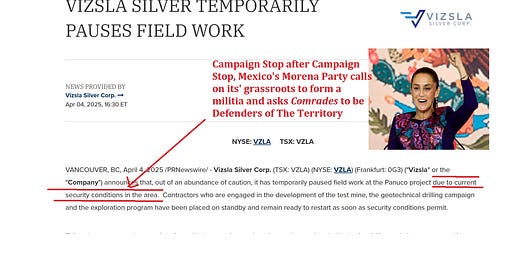VIZSLA SILVER PAUSES FIELD WORK IN MEXICO
One interpretation is this isn't an isolated event but a chronic condition. Are Mexican Citizens Rising Up To Defend a Position that the Resources of Mexico Belong to the People of Mexico?
The decision by Vizsla Silver to pause fieldwork at its Panuco project in Mexico underscores the growing tension between foreign mining companies and a grassroots movement demanding greater control over Mexico’s natural resources. While the company cites "security conditions" as the reason for halting operations, this development cannot be divorced from the broader socio-political climate in Mexico, where calls for "Silver Sovereignty" have gained momentum.
A Rising Wave of Resource Nationalism
Mexico's Morena party, started by former President Andrés Manuel López Obrador (AMLO), has long championed resource nationalism, urging citizens to "defend the territory" and reclaim control over the nation's vast mineral wealth. This rhetoric has resonated with a coalition of campesinos, indigenous groups, and labor unions who see foreign-owned mining operations as a modern form of colonial exploitation.
Mexico’s Morena party views the North American controlled Silver mining business model through a left leaning lens, (i.e. the wealth generated by these mines benefits distant shareholders in Canada or the United States while leaving local communities grappling with environmental degradation and economic inequality.)
The temporary halt at Vizsla Silver’s project may reflect more than just localized security concerns. It appears to be part of a broader grassroots pushback against North American mining companies operating in Mexico. Activists have increasingly framed these operations as emblematic of foreign exploitation, calling for nationalization, higher taxes and stricter regulations to ensure that profits are reinvested into Mexican communities.
Morena's Influence and Grassroots Mobilization
The Morena party has played a pivotal role in galvanizing public sentiment against foreign mining interests. By framing resource sovereignty as essential to Mexico's energy future and economic independence, Morena has effectively mobilized its base to take action. The coalition of activists opposing foreign-owned silver mines aligns with Morena’s broader agenda of reducing foreign influence in critical sectors like energy and mining.
This grassroots movement is not without its risks. Reports suggest that some factions within this coalition may have resorted to threats or intimidation to disrupt mining activities. Whether these actions are officially sanctioned or represent independent initiatives by local groups remains unclear. However, they highlight the precarious balance between legitimate protest and unlawful interference in an industry critical to both local economies and global markets.
Economic Implications and Geopolitical Context
Mexico is the world’s largest producer of silver, contributing nearly a quarter of global output. Foreign investment has historically driven this sector, but rising tensions could deter future investments, potentially impacting Mexico’s economy. At the same time, global demand for silver—fueled by its use in renewable energy technologies—has never been higher. This creates a paradox: while Mexico seeks to assert greater control over its resources, it risks alienating the very investors needed to capitalize on booming silver markets.
Compounding these challenges is the geopolitical backdrop. Former U.S. President Donald Trump’s economic policies, which prioritized reshoring supply chains and reducing dependence on foreign minerals, may have inadvertently stoked anti-American sentiment in regions like Mexico. This could explain why North American companies are increasingly viewed with suspicion or hostility.
The Path Forward
Vizsla Silver’s pause in operations reflects a microcosm of larger issues facing Mexico’s mining sector: balancing economic development with social justice and environmental sustainability. The company’s assurance that this suspension will not materially affect its 2025 plans suggests confidence in a resolution but this is the only statement they could make.
In cases like this it has to be pretty significant for them to release this “safety concern”
If it were just some random act of violence Vizsla would suppress the event as “isolated” but the fact they decided to issue a press release suggests they are seeing a pattern (chronic) not isolated disturbances in their operations.
The truth is the underlying tensions between foreign corporations and local communities remain unresolved.
For Mexico, the challenge lies in navigating these competing interests without undermining its status as a global mining powerhouse. Whether through stricter regulations, greater community engagement, or even partial nationalization, the government must find a way to ensure that the benefits of silver mining are equitably distributed while maintaining investor confidence.
In this charged environment, Vizsla Silver's experience may serve as a bellwether for other foreign mining companies operating in Mexico. As calls for "Silver Sovereignty" grow louder, it is clear that the era of unchecked foreign dominance in Mexico’s mining sector is coming under intense scrutiny—and nearing its end.
and it appears…
Endeavour Silver Has Also Had Enough with Mexico’s Morena Party.
Endeavour Silver’s recent $145 million acquisition of the Minera Kolpa mine in Peru signals a strategic pivot away from its historically Mexico-focused operations. This sudden move, finalized within the last four business days, marks Endeavour’s first venture outside Mexico after exclusively operating there for nearly two decades. The shift appears to reflect growing concerns over Mexico’s increasingly challenging political and social climate, including grassroots movements opposing foreign-owned mining operations. By diversifying into Peru, Endeavour reduces its reliance on Mexico and mitigates geopolitical risks, aligning with broader trends in the silver industry to secure growth in more stable jurisdictions
to be continued Monday where we examine a pattern showing that a major Silver producer (owned by North Americans) began divesting in Mexico the same year Mexico nationalized Lithium (2022)




